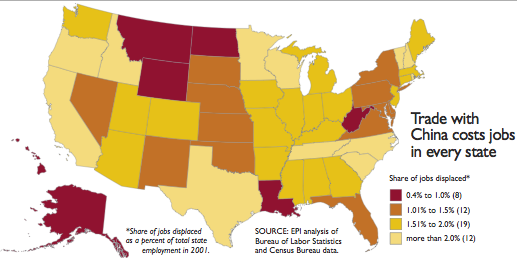 According to a recent study by a Washington D.C.-based think tank, job loss due to trade with China has hit Oregon harder than nearly any other state in the nation.
According to a recent study by a Washington D.C.-based think tank, job loss due to trade with China has hit Oregon harder than nearly any other state in the nation.
STATEWIDE According to a recent study by a Washington D.C.-based think tank, job loss due to trade with China has hit Oregon harder than nearly any other state in the nation. The report by the Economic Policy Institute shows that in the seven years following the admission of China into the World Trade Organization in 2001, trade with the country cost Oregon 2.9% of its workforce — the fourth-largest drop.
According to the study, 2.3 million American jobs were lost or displaced between 2001 and 2007 as the U.S. trade deficit with China increased from $84 billion to $262 billion. The reasons cited by the Institute for that deficit increase are well known to the business community: China’s manipulation of its currency, its non-tariff barriers to imports and its suppression of labor rights.
However, the study may not have fully addressed some of the factors that offset those losses. Art Ayre, employment economist with the Oregon Employment Department, could not comment on the specifics of the report. He did, however, describe how his department had attempted to do a similar analysis on job loss due to trade with Mexico but were stymied by several factors, including that trade agreements create cheaper goods for American consumers and help retain high-paying domestic jobs, all of which creates more disposable income, which in turn generates new jobs.
“We came to the conclusion that it was impossible to tell what the impacts of trade [with Mexico] were,” Ayre says.
Joy Margheim, a policy analyst with the Oregon Center for Public Policy, says she hopes the Institute’s report will remind state policy makers of the importance of safety nets — such as job retraining programs — for employees.
“In the past if you were laid off because of an economic cycle, you could get your job back,” she says. “But now we’re looking at permanent shifts in the economy.”
ABRAHAM HYATT

Have an opinion? E-mail [email protected]


